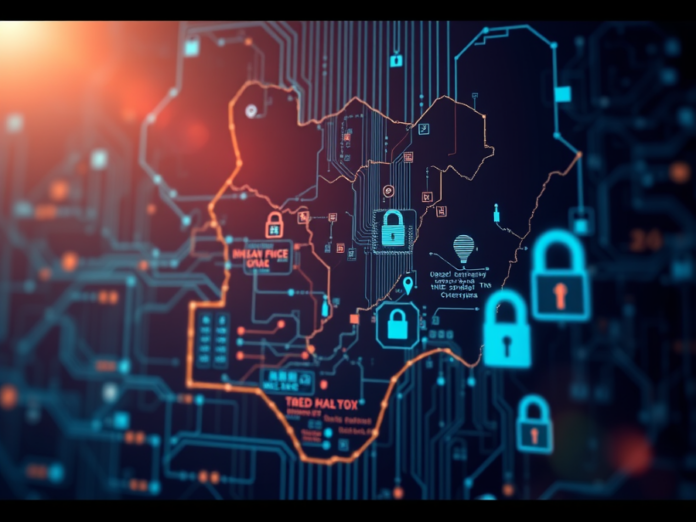Despite Nigeria’s aggressive efforts to curb cybercrime, digital threats continue to rise across Africa, exposing businesses and individuals to significant cybersecurity risks. While Nigerian law enforcement has made notable strides—arresting over 1,000 cybercriminals and successfully prosecuting 152 cyber-related fraud cases in the past year—the continent remains a hotspot for digital fraud and cyberattacks.
On February 3, 2025, Nigeria’s Economic and Financial Crimes Commission (EFCC) charged 42 foreign nationals, predominantly Chinese and Filipino, for their involvement in cryptocurrency investment scams and romance fraud schemes. The arrests followed a sweeping December 2024 crackdown on a cybercriminal syndicate allegedly comprising nearly 800 individuals. The EFCC accused the defendants of orchestrating cyber fraud schemes that exploited Nigerian youth, further destabilizing the nation’s economy and social framework.
The Persistent Cybersecurity Challenge in Africa
Cybercrime remains a formidable issue in Nigeria and across Africa. According to cybersecurity firm Check Point Software Technologies, the average African organization experiences nearly 3,200 cyberattacks per week—73% higher than the global average. The continent’s digital landscape is increasingly exploited by cybercriminals, with eight African countries ranking among the top 20 global hotspots for cyber threats. Ethiopia tops the list, while Nigeria holds the 19th position.
Africa’s rapid technological adoption, coupled with insufficient security measures, has made it a prime target for cybercriminals. Lionel Dartnall, acting country manager for South Africa at Check Point, notes that attackers often test new hacking techniques in Africa before deploying them elsewhere. The widespread adoption of cloud computing and an expanding digital footprint have amplified these vulnerabilities, making cybersecurity a pressing concern.
Cybersecurity Readiness: A Global South Perspective
According to the World Economic Forum’s Global Cybersecurity Outlook 2025, African, Latin American, and South Asian nations report the lowest levels of cyber resilience. In contrast to Europe and North America, where only 15% of organizations express concerns about national cybersecurity readiness, a staggering 36% of African organizations and 42% of Latin American firms lack confidence in their ability to respond to cyber incidents.
Despite these challenges, Africa is also home to some of the world’s fastest-growing economies. Eleven of the 20 fastest-growing economies are on the continent, driven by a young, tech-savvy population. However, with increased digitalization comes greater cybersecurity risks. Currently, Africa has only 20,000 qualified cybersecurity professionals—a stark contrast to the continent’s growing need for digital security expertise. Both public and private sectors are making concerted efforts to address this shortfall by investing in cybersecurity training programs, particularly for young people, to create employment opportunities and bridge the critical skills gap.
Nigeria’s Cybercrime Landscape and Economic Challenges
Nigeria faces a disproportionately high number of cyberattacks compared to the global average. Economic instability exacerbates the issue, with inflation exceeding 30%, rising unemployment, and increasing national debt, according to PricewaterhouseCoopers’ 2025 Nigeria Budget and Economic Outlook. In 2024, public opposition forced the Nigerian government to pause the implementation of a cybersecurity tax intended to fund national cyber defense initiatives. Despite these economic pressures, cybercrime syndicates remain active, leveraging Nigeria’s digital ecosystem to orchestrate fraud on a massive scale.
Addressing the Cybercrime Epidemic: Law Enforcement and Prevention
To combat cybercrime, Nigeria is focusing on strengthening cybersecurity training and public awareness. The government has partnered with organizations like the Student Union Executives and the Nigeria Internet Registration Association (NIRA) to educate young people about the dangers of cyber fraud while promoting ethical cybersecurity careers.
Enforcement agencies have also intensified their crackdown on cybercriminals. In July 2024, Interpol coordinated with law enforcement from 21 nations in Operation Jackal III, which targeted West African cybercrime syndicates involved in financial fraud. Later, in December 2024, a similar international effort led to over 1,000 arrests linked to $192 million in financial losses across Africa.
The International Dimension of Cybercrime in Nigeria
The Nigerian government asserts that many cybercrime syndicates operating within its borders are led by foreign nationals. The December 2024 raid that resulted in 792 arrests uncovered that nearly a quarter of the suspects were not Nigerian citizens. Among them were 148 Chinese, 40 Filipinos, two individuals from Kharzartan, one Pakistani, and one Indonesian.
Ola Olukoyede, chairman of the EFCC, emphasized Nigeria’s commitment to eliminating cybercrime networks, stating: “Foreigners are exploiting our nation’s unfortunate reputation for cyber fraud to establish criminal enterprises. However, as this operation demonstrates, Nigeria will no longer serve as a safe haven for cybercriminals.”
The Path Forward: Strengthening Cybersecurity in Nigeria and Beyond
To effectively tackle cybercrime, Nigeria and other African nations must continue to enhance their cybersecurity frameworks, invest in digital security education, and foster international cooperation. The private sector, governments, and cybersecurity firms must collaborate to build a robust cyber defense infrastructure capable of withstanding the evolving tactics of cybercriminals.
With proactive law enforcement efforts and a growing emphasis on cybersecurity training, Nigeria aims to shift its digital landscape from being a target of cybercriminals to a leader in cybersecurity resilience. As Africa embraces the digital future, ensuring a secure and trusted cyber ecosystem will be critical to sustainable economic growth and technological advancement.
















 The African Research (AR) Index is a comprehensive scholarly directory and database focused explicitly on journal publishers that publish and disseminate African research.
The African Research (AR) Index is a comprehensive scholarly directory and database focused explicitly on journal publishers that publish and disseminate African research.

